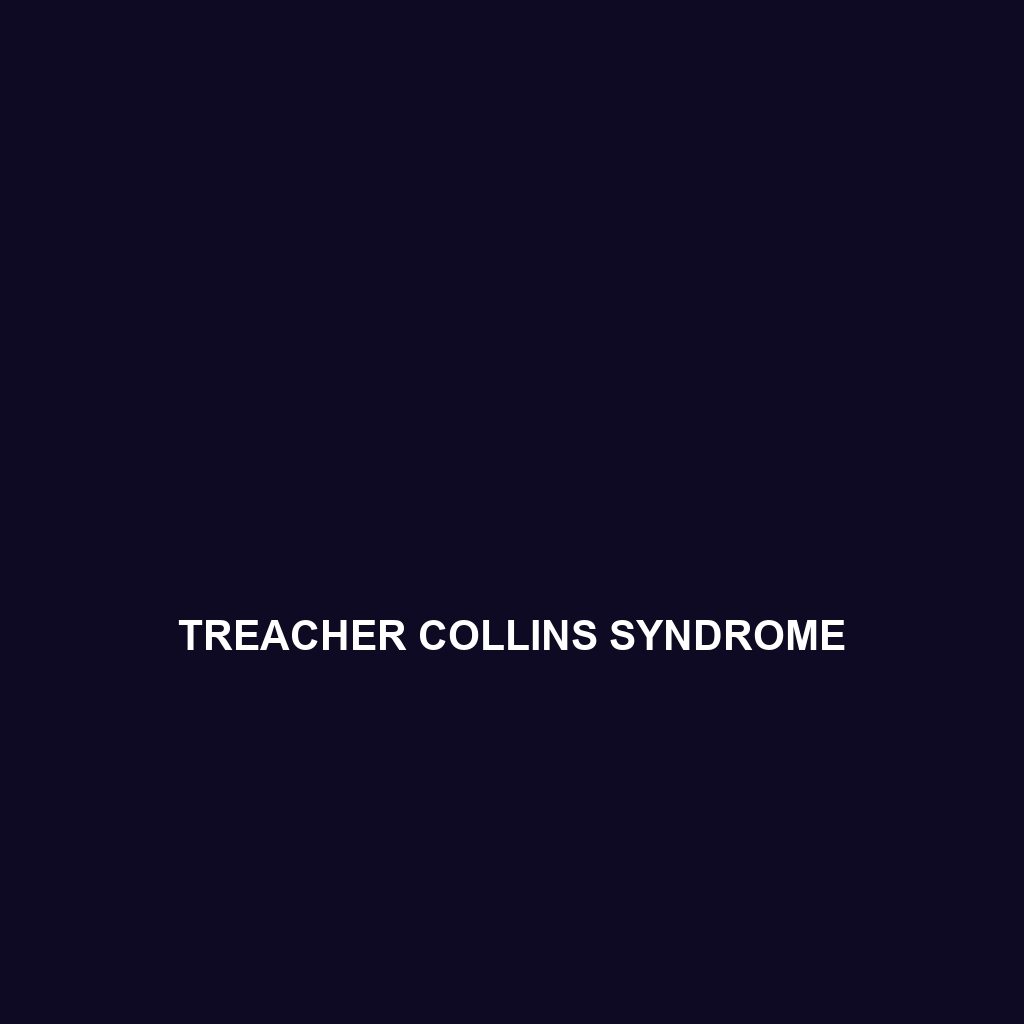Treacher Collins Syndrome:
Definition and Description of Treacher Collins Syndrome:
Treacher Collins Syndrome (TCS) is a genetic disorder that affects the development of bones and other tissues of the face. It is characterized by a range of facial and cranial abnormalities, including underdeveloped cheekbones, a small jaw, and deformities of the ears. TCS results from mutations in the TCOF1, POLR1C, and POLR1D genes, which are essential for the proper development of facial structures during embryonic growth. The condition is typically inherited in an autosomal dominant pattern, meaning that only one copy of the mutated gene from either parent is sufficient to cause the syndrome.
Causes of Treacher Collins Syndrome:
The primary cause of Treacher Collins Syndrome is genetic mutations that affect the development of the facial bones and tissue. Most cases are due to inherited mutations in the TCOF1 gene, while others may arise from mutations in POLR1C or POLR1D genes. The mutation can occur spontaneously during egg or sperm formation, which means that it can appear in families with no prior history of the syndrome. External factors are not considered to influence the occurrence of TCS significantly.
Associated Symptoms of Treacher Collins Syndrome:
Symptoms of Treacher Collins Syndrome can vary widely but commonly include:
- Underdeveloped facial bones, particularly in the midface region.
- Cleft palate or other dental anomalies.
- Hearing loss due to bone malformations in the ear.
- Abnormalities of the eyelids, such as lower eyelid colobomas.
- Facial asymmetry and underdeveloped jaw.
Diagnosis of Treacher Collins Syndrome:
Diagnosis of Treacher Collins Syndrome is often made based on clinical features observed by a healthcare professional. A thorough medical history, physical examination, and family history are essential. Genetic testing can confirm the diagnosis by identifying mutations in the associated genes. Imaging studies, such as X-rays or CT scans, may also be utilized to evaluate any structural facial abnormalities.
Risk Factors for Treacher Collins Syndrome:
Individuals are primarily at risk for Treacher Collins Syndrome if they have a family history of the condition, as it is often inherited. It affects males and females equally and can occur in individuals of any ethnicity. Most cases are diagnosed in infancy or early childhood, though milder forms may not be recognized until later in life.
Complications of Treacher Collins Syndrome:
If left untreated, Treacher Collins Syndrome can lead to several complications, including severe dental issues, difficulty with breathing (particularly if cleft palate is present), and social and psychological challenges arising from visible disfigurements. Hearing loss can also significantly affect communication and social development.
Treatment Options for Treacher Collins Syndrome:
Treatment for Treacher Collins Syndrome is tailored to the individual’s specific conditions and may include:
- Orthodontic treatments for dental issues.
- Surgical interventions to correct facial deformities and improve function.
- Hearing aids or cochlear implants to address hearing loss.
- Speech therapy to enhance communication skills.
When to See a Doctor for Treacher Collins Syndrome:
It is important to see a healthcare professional if there are concerns about a child’s development, facial structure, or hearing. Early diagnosis and intervention can significantly improve quality of life and contribute to better social integration.
Prevention of Treacher Collins Syndrome:
Currently, there are no known methods of preventing Treacher Collins Syndrome, as it is primarily genetic in nature. Genetic counseling is recommended for individuals with a family history of the syndrome who are considering starting a family.
Statistics and Prevalence of Treacher Collins Syndrome:
Treacher Collins Syndrome occurs in approximately 1 in 50,000 births, making it a relatively rare condition. It affects men and women equally, and severity can vary significantly from one individual to another.
Personal Stories or Case Studies about Treacher Collins Syndrome:
Numerous individuals with Treacher Collins Syndrome have shared their experiences, highlighting the challenges they face and how they navigate social situations. These personal stories underscore the resilience of those affected and the importance of support systems in enhancing their quality of life.
Myths and Misconceptions about Treacher Collins Syndrome:
There are several myths surrounding Treacher Collins Syndrome, including the belief that it is contagious or that it results from poor parenting. It is crucial to dispel these misconceptions by educating the public about the genetic nature of the condition and the importance of supportive environments.
Support and Resources for Treacher Collins Syndrome:
Support groups and resources provide essential assistance for families and individuals impacted by Treacher Collins Syndrome. For more information, visit this support page for additional resources and help.
Conclusion about Treacher Collins Syndrome:
In summary, Treacher Collins Syndrome is a genetic condition with various implications for those affected. Early detection and treatment can improve the quality of life for individuals with TCS, and community support plays a vital role in their integration into society. Raising awareness and understanding of this condition is crucial for encouraging empathy and support for those impacted.
